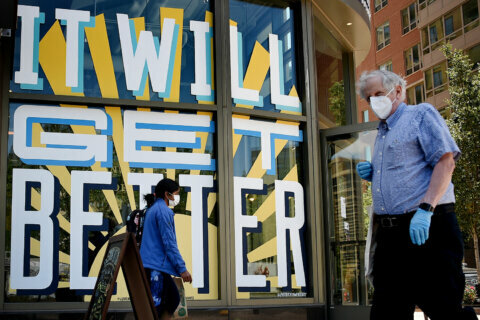With multiple people testing positive for the new coronavirus in D.C., Maryland and Virginia, local executives are advising area residents to not panic; however, health experts say you should be prepared and use common sense every day.
The COVID-19 virus is something new, and the Centers for Disease Control and Prevention said it is still learning how it is spread. But it is transmitted like many other respiratory infections and can spread from person to person.
“For most people, the immediate risk of being exposed to the virus that causes COVID-19 is thought to be low. This virus is not currently widespread in the United States,” the CDC says.
“The risks to the general population is extremely low,” said Fairfax Mayor David Meyer, at a Sunday news conference about the most recent case involving a Fairfax man.
“No one should panic,” said Fairfax County Board of Supervisors Chairman Jeffrey C. McKay, adding that adhering to good hygiene practices to prevent the spread of illnesses.
“I’d like the public to know that no additional precautions are recommended at this time beyond the simple daily measures that everyone should always take to prevent the spread of influenza and other respiratory illnesses to stop the spread of germs,” said Dr. Benjamin Schwartz, Fairfax County’s director of epidemiology and population health, during the news conference.
WHAT YOU SHOULD NOT DO
- Don’t panic over what you are hearing about coronavirus.
- Don’t hoard or stockpile supplies.
- If you know someone is sick, don’t spend time with them, unless it is absolutely necessary.
- Don’t go to work if you are sick.
- If you are sick, avoid public areas and public transportation.
- Don’t bother with a face mask, unless you are showing signs of COVID-19.
WHAT YOU SHOULD DO
Maintain basic, good hygiene. Your mom already taught you much of this.
The CDC recommends the following:
- Wash your hands often with soap and water for at least 20 seconds. If soap and water are not available, use an alcohol-based hand sanitizer.
- While it is difficult to do, avoid touching your eyes, nose and mouth with unwashed hands.
- Cover your cough or sneeze with a tissue, then throw the tissue in the trash.
With your family:
For now, coronavirus doesn’t require you to take drastic measures. No outbreaks have been declared.
- Go about your life as you normally would.
- You don’t need to take the kids out of school or work from home.
- Think of coronavirus like you would a big storm and plan for what you will do.
Do plan ahead:
- Do you have an emergency kit on hand?
- Do you have enough food on hand for several days? That’s the CDC’s general advice for emergency preparedness. Homeland Security recommends a two-week supply. Nonperishable and ready-to-eat foods are recommended. And don’t forget food for your pets.
- Can you work from home, if necessary?
- What would you do in a worst-case scenario if schools or daycare centers close?
- Do you have medicines you need on hand? Have at least a 30-day supply on hand. Discuss emergency preparations with your family.
Around your home and office:
- In elevators and doorways, use your coat or gloves or a tissue to press the buttons. If you use your hands, wash them afterward. If you have to grab a door handle, follow-up with hand-washing or sanitizer.
- Clean things that are touched a lot — countertops, light switches, doorknobs, cabinet handles — daily using ordinary detergent and water, the CDC advises.
- Use disinfectant on surfaces at work.
- Use a paper towel to create a barrier so you are not touching things directing. This works well for the following tasks:
- Opening the refrigerator.
- Using the coffee maker.
- Turning sink faucets on and off.
- Pushing a button to fill up water bottles.
- Operating the microwave.
- More coronavirus news
- Coronavirus test results in DC, Maryland and Virginia
- Coronavirus FAQ: What you need to know
The Associated Press, Melissa Howell, Kristi King and Rick Massimo contributed to this article.







